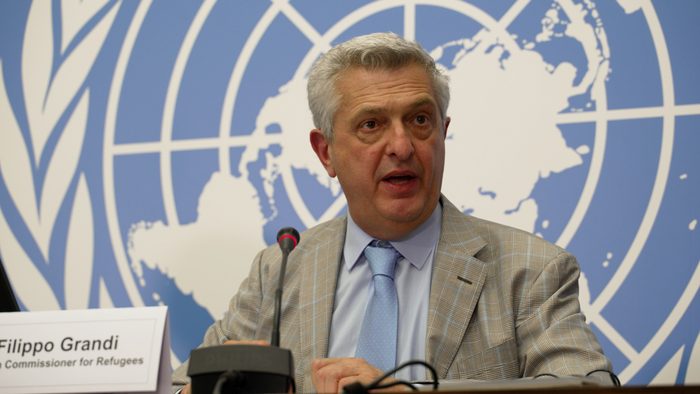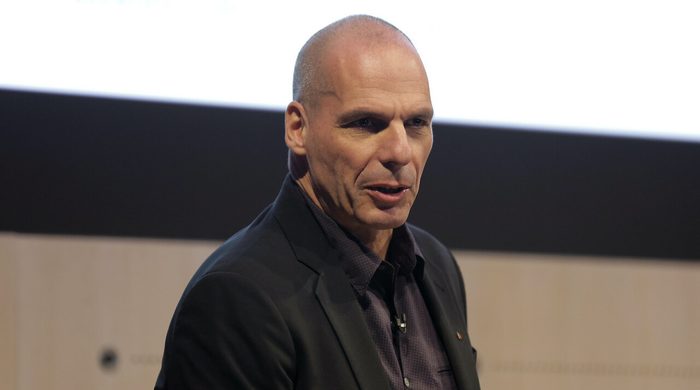Good morning, this is Megha. As the UK plans to send its first flight with asylum seekers to Rwanda as part of a $150m deal, the UN high commissioner for refugees has called the scheme “all wrong”.
The 50th session of the Human Rights Council began on Monday. The top updates have been that Chief Bachelet will not be seeking re-election and the Palestinian criticism of the US. Meanwhile, Yanis Varoufakis, the former finance minister of Greece, has slammed the EU for its half-hearted approach to the war in Ukraine. |

|

The UN high commissioner for refugees Filippo Grandi spoke to the media on Monday in Geneva. (Credit: UNHCR/Photographer)
|
|
UN refugee chief slams UK deportation plans.
A day before the first flight to Rwanda carrying asylum seekers was scheduled to take off from the United Kingdom, the United Nations high commissioner for refugees Filippo Grandi called the deportation plan “all wrong”. “We believe that this is all wrong. This is all wrong,” he told reporters in Geneva on Monday at a briefing and pointed out that exporting one’s obligations to deal with asylum seekers was contrary to principles of sharing international responsibilities enshrined in the 1951 Refugee Convention, which the UK has ratified.
Geneva Solutions (EN)
|
|
Here’s what else is happening
|

Yanis Varoufakis, finance minister of Greece in 2015. (Credit: Chatham House/CC BY 2.0)
|
|
‘Afghanistan's dreadful mess is what will happen to Ukraine’.
Yanis Varoufakis served as Greece's finance minister for six months in 2015, when his country went into bankruptcy. The 61-year-old economics professor regained a seat in the Greek parliament in July 2019 with his newly founded left-wing party Mera25. A highly regarded European public figure, Varoufakis spoke at the 6th edition of the Global Investment Forum in Geneva last week with great candour. We asked him what the future holds as the war in Ukraine rages on and the Covid-19 pandemic continues to unravel.
Geneva Solutions (EN)
|
|
|
Science and diplomacy reads by GESDA
|
|

Credit: Massachussetts General Hospital
|
|
The brain will not remain a black box for long.
Not one week passes without the publication of one or several articles about newly developed or improved brain-computer interfaces, or more generally, neurotechnological tools. Like the 10,000 electrodes implantable chip able to “read” the activity of the brain with an extreme accuracy (read below), or the new wearable MEG system to evaluate epilepsy in children, or the “stentrode” implant that doesn't require a hole to be drilled into the skull and can be placed through a vein directly onto the brain as a cardiac stent: this brain-computer interface can then collect and wirelessly transmits information directly from the brain, without the need for open surgery!
“The increasing availability of brain data within and outside the biomedical field, combined with the application of artificial intelligence (AI) to brain data analysis, poses a challenge for ethics and governance,” underlines Marcello Ienca, at EPF Lausanne. Along with other groups, this neuroethicist estimates, in a new policy paper, that it is time to act, as they identify distinctive ethical implications of brain data acquisition and processing, and outline a multi-level governance framework: “This framework is aimed at maximising the benefits of facilitated brain data collection and further processing for science and medicine whilst minimising risks and preventing harmful use. The framework consists of four primary areas of regulatory intervention: binding regulation, ethics and soft law, responsible innovation, and human rights.”
“The brain is a world consisting of a number of unexplored continents and great stretches of unknown territory,” wrote Santiago Ramon y Cajal, a pioneer Spanish neuroscientist. That was about one century ago. Now that this new quest is really starting, it is crucial to make sure that the conquistadors of the brain act wisely.
- Olivier Dessibourg, GESDA
|

This selection is proposed by the Geneva Science and Diplomacy Anticipator
GESDA, working on
anticipating cutting-edge science and technological advances to develop innovative and inclusive
solutions for the
benefit of the planet and its inhabitants.
|
|
GS news is a new media project covering the world of international cooperation and development. Don’t hesitate to forward our newsletter!
Have a good day!
|

|
|
Avenue du Bouchet 2
1209 Genève
Suisse
|
|
|
| |











